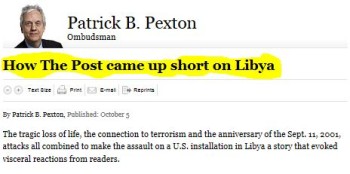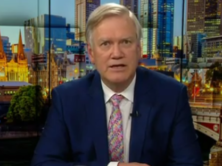
(Credit: Washington Post, screenshot, highlight added)
Two U.S. public editors — the Washington Post’s Patrick Pexton and the New York Times’ Margaret Sullivan — have weighed in this month on their newspapers’ coverage of Libya and the Sept. 11, 2012 attack that killed U.S. ambassador Christopher Stevens. Washington Post public editor, Patrick Pexton, commented Oct. 3 that:
“The Post’s coverage of the Libya attack was good early and good late, but there was an unfortunate gap in the middle — partly but not completely explained by personnel issues — that made it look like The Post was shying away from a full-court press to find out what the Obama administration knew and whether it was giving a true portrayal of the attack.”
Pexton wrote that the Post’s reporting on the first days after the attack included “a story rich on detail and background” but that then the newspaper switched its focus to “the increasing and widespread protests around the world.” While Pexton described the protests as “a real story,” he acknowledged the Post “was not delving into why” Stevens and others were killed.
“Reporting on the Libya attack was either buried in the overall protest stories or put on pages deep inside the A section. And it was thin,” he wrote.
Pexton explained that the newspaper had limited reporters on the ground but that “The Post has been on it almost every day” from Sept. 28 on. However, he still called for more reporting on the attack, noting that the “thin” reporting prompted complaints and questions of bias. “The Post needs to keep digging. That gap in the middle enraged many readers and reinforced their false suspicions that The Post is trying to cover for Obama, and it can’t let that happen,” he wrote.
New York Times public editor Margaret Sullivan noted the Times’ Oct. 11 front page didn’t feature news about the Oct. 11 “Congressional hearing on Libya,” whereas other national newspapers did.
Sullivan reported that Times readers complained about and questioned the lack of prominent coverage, but the newspaper’s managing editor Dean Baquet argued “there were six better stories” to feature on the front page.
Like Pexton, Sullivan called for “aggressive reporting” from the Times on Libya and commented that the Times should have put reports on the hearings on the front page. “It had significant news value, regardless of the political maneuvering that is inevitable with less than four weeks to go until the election. And more broadly, there is a great deal of substance on this subject that warrants further scrutiny.”
iMediaEthics has written previously about ethics in reporting on the Libya attack. News outlets including the Times and the Globe and Mail defended publishing photos of the ambassador, Stevens, after the attack and the National Press Photography Association discussed the ethics and standards of the photos. The U.S. Embassy in Algiers accused Algerian newspaper Ennahar of publishing a doctored photo showing Stevens with the man reportedly behind the video “The Innocence of Muslims,” a controversial, inflammatory film that was partly blamed for the violent attacks. And, the U.S. State Department called out CNN for reporting on information it found in a journal of Stevens’ after the attack.
iMediaEthis is writing to Pexton for further comment and will update with any response.
Hat Tip: Michael Calderone
UPDATE: 10/17/2012 4:57 PM EST: Pexton told iMediaEthics by email that: “I think it’s a little too soon to tell yet whether The Post has improved. Some good stories still coming out of Libya and Cairo. I’m still watching the domestic reporting.”





Comments Terms and Conditions